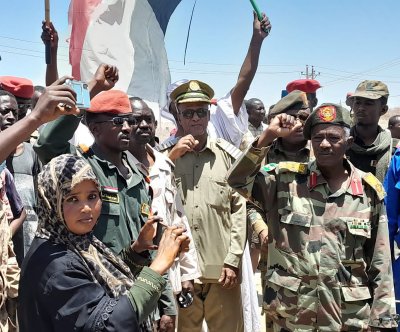
Sudanese people and soldiers loyal to the national army attend a demonstration to support army chief Abdel Fattah al-Burhan against his rival Mohamed Hamdan Daglo, the leader of Rapid Support Forces, in Al Qadarif city, Sudan, on April 20. On Thursday, the warring sides agreed to a declaration. Photo by Sudan News Agency/UPI | License Photo
May 11 (UPI) — Sudan’s warring sides have agreed Thursday to protect civilians amid their bloody conflict, officials with mediating nations United States and Saudi Arabia confirmed, raising hopes that a cease-fire, even one lasting only a matter of days, may be achieved.
Representatives from both the Sudanese Armed Forces and the Rapid Support Forces signed the agreement in Jeddah that is being called the Declaration of Commitment to Protect the Civilians of Sudan. Its signing has been confirmed by U.S. officials and the Saudi foreign ministry, though neither of the warring parties have yet to comment.
A senior State Department official told reporters in a background teleconference that the agreement was named at the request of the warring sides “to emphasize that they are interested in trying to help the civilians who are suffering from this fighting.”
“It recognizes the obligations of both sides under international humanitarian and human rights law to facilitate humanitarian actions to meet the needs of civilians.”
#Statement | The kingdom of Saudi Arabia and the United States of America are pleased to announce that on May 11, 2023 in Jeddah, representatives of the Sudanese Armed Forces and the Rapid Support Forces signed a declaration commitment to protect the civilians of Sudan. pic.twitter.com/d1boeMH0j7— Foreign Ministry (@KSAmofaEN) May 12, 2023
The Northeast African nation has for years teetered on the precipice of war and stability since the military ousted the country’s former three-decade dictator government of President Omar al-Bashir in a civilian-backed coup in 2019.
As the country crawled toward a democracy, Gen. Abdel Fattah al-Burhan, head of the Sudanese Armed Forces, and his deputy, Rapid Support Forces head Gen. Mohamed Hamdan Dagalo, executed another coup but infighting over control of the government has turned into bloodshed, with civilians paying a heavy price.
Since the fighting began, more than 736,000 have been internally displaced — a number that is comparable to all those displaced in the country during 2021 and 2022 combined, according to statistics from the United Nation’s Displacement Tracking Matrix system, which stated another 177,000 have also crossed into bordering nations. This is on top of the 3.7 million who were internally displaced prior to April 15.
Earlier this week, the U.N.’s World Health Organization said some 600 people have been killed and more than 5,000 injured in the fighting. More than two dozen attacks on health facilities have been tallied and millions are in need of humanitarian assistance.
The senior State Department official said the purpose of the agreement is to “guide the conduct” of the warring sides so humanitarian assistance can reach those who need it, downed essential services, such as electricity and water, can be repaired, security forces can withdraw from hospitals and clinics and the dead can be buried.
With the agreement signed during what has been called “pre-negotiations,” work can now begin on achieving a 10-day cease-fire, the official said.
Since April 15, the two sides have agreed to previous cease-fires though they were repeatedly violated. Now, a cease-fire monitoring mechanism supported by the U.N., Saudi Arabia and other international communities has been developed, the senior State Department officials said.
Overhead imagery, including thermal and satellite data, as well as social media analysis and on-the-ground reporting are involved in the mechanism that will permit observers to determine attribution in cases where there are cease-fire violations, a second State Department official said.
That official described the agreement as “the first step” in what they hope to achieve in Jeddah with the next stop focusing on negotiating specific security measures the two sides will take to secure conditions to delivery humanitarian assistance.
Concerning a potential end to the conflict, the first official said that given “the depth of enmity” on both sides they don’t see “an easy solution,” which is why they are focused on smaller, near-term answers from this document.

0 Comments :
Post a Comment